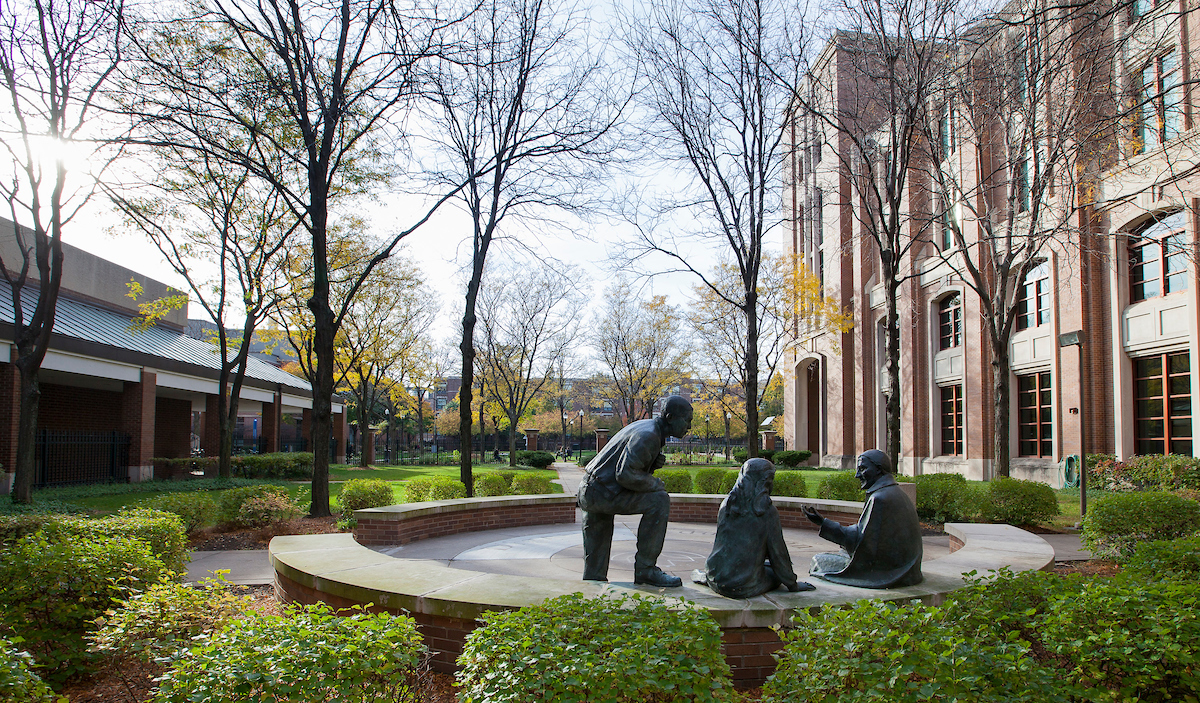 (DePaul University/Josh Woo)
(DePaul University/Josh Woo)High school and college students are not immune to addiction, and many students enter college in recovery from substance use disorders. What do those students do to maintain recovery once they’ve made the decision to leave home, and maybe a recovery community there, to pursue their studies?
Collegiate recovery communities, or communities of people in recovery who are also college students, are often a resource students have access to on their campus. They have been around since the 1980s, when Rutgers University established one. DePaul students now have the option to join a similar community.
“My predecessor began considering a collegiate recovery community at DePaul in 2014, in response to a number of students inquiring about such a program,” says Kate Lower, an alcohol and substance abuse prevention specialist in the Office of Health Promotion and Wellness. “There was a desire on our students’ part to have this option, and we know, based on extensive research, programs like this do a lot for student academic success and retention.”
Generally, recovery communities allow students to connect with people who have had similar experiences and challenges, making them feel welcome and supported. Because these communities can take many forms, DePaul implemented a program that would best fit the university, based upon student feedback.
“Collegiate recovery communities look quite different from campus to campus, and there was a lot of conversation among HPW, Residential Education and Housing about what format would best support DePaul students,” Lower shares. Ultimately, HPW conducted a student survey asking what students would like to see in a collegiate recovery community.
The DePaul CRC was established shortly after the survey, during the 2017-18 academic year, and consists of weekly, one-hour meetings around campus. Three to four students have participated in the group regularly over the past two academic years.
While students can reach out to general recovery communities in their college city or town, many schools have formed on-campus groups for their students because college campuses and culture present unique challenges when it comes to maintaining recovery.
“College campuses are referred to as ‘abstinence-hostile environments’ because of the direct pressure to use drugs and alcohol, as well as a general expectation that one needs to drink and use drugs to participate fully in college life,” Lower says. On-campus recovery communities can be critical to sobriety.
Thomas,* a DePaul student, has attended the CRC each week in an effort to maintain his recovery since 2017. After abusing marijuana beginning at age 13, Thomas entered recovery just before coming to DePaul. For him, the CRC was crucial to his recovery and success on campus.
“The program is a safe space for recovering students,” he shares. “It’s the one place where we get to talk about the traumatic experiences we’ve had - experiences only other recovering students could understand.”
He also noted only other recovering college students understand what it means to be a student in recovery.
“The people in DePaul’s program are young adults who had similar experiences growing up,” he says. “The immediate connection around our similarities has allowed for more effective weekly meetings.”
Though the program at DePaul has seen success, there is room for growth, such as enhancing the ways the community members connect. The program is voluntary, and students have to take their own initiative to attend. It’s difficult for young people to show up to a meeting with a group of strangers, Thomas says.
Lower believes the stigma attached to addiction and recovery also is a barrier to participation. One of the biggest challenges the program faces is making students, faculty and staff aware that it exists.
“First of all, you’re not going to get in trouble either for struggling with addiction or relapsing,” Thomas says with regard to students who might benefit from the program but are hesitant to come. “All students in recovery, regardless of their path to recovery or their particular addiction, will fit into the group.”
Thomas and Lower also encourage students in recovery to join the group because it is one of the few places you can freely talk about addiction and recovery, as well as the unique challenges, particularly in a college environment. The program offers support, but also holds students accountable for continuous work on their recovery, which is essential.
The reality of addiction is that sometimes, it wins the battle. Thomas experienced this reality first-hand when another student who participated in the CRC during the 2017-18 academic year was not able to overcome her addiction. Recovery can’t be done alone, Thomas notes. The more people who know about the struggle, the more likely someone is to get the full support needed to overcome an addiction.
For more information about the Collegiate Recovery Program at DePaul, contact Kate Lower at (773) 325-7129.
*The name of the student has been changed for privacy